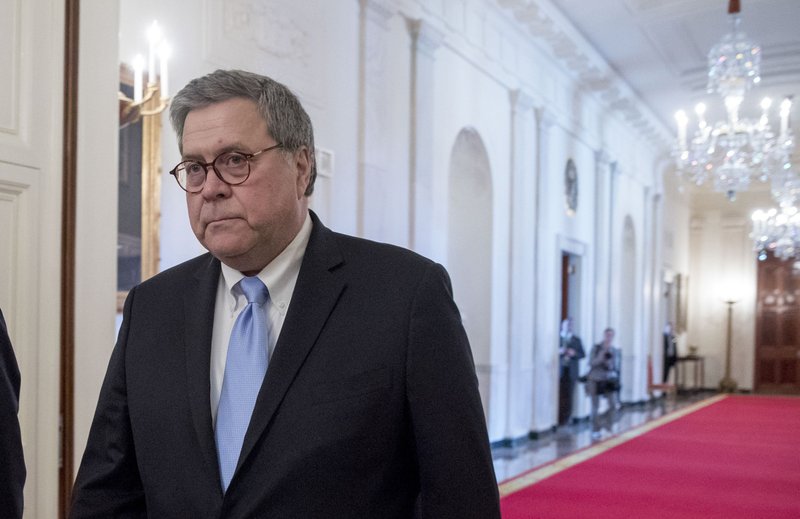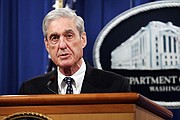WASHINGTON -- Attorney General William Barr in an interview broadcast Friday distanced the Justice Department from special counsel Robert Mueller's report on Russian meddling in the 2016 election.
During the CBS interview, Barr said he could have skipped writing his summary of the special counsel's work if investigators had done more to prepare the report for public consumption.
Barr said that he had expected the special counsel to identify the material in the report protected by grand jury secrecy rules, so that it could be quickly redacted and the report released. Had that happened, he said that the redaction process would have taken only a few days and his letter would have been unnecessary.
"Once I realized it was going to take three or four weeks, I felt I had to say something in the interim," Barr said.
The letter he wrote to Congress in March said the special counsel did not find evidence to establish a conspiracy by anyone on President Donald Trump's campaign to help Russia interfere in the 2016 election, and that Barr decided Trump had not committed obstruction of justice, playing down the special counsel's fuller, more damning portrait of the president's possible attempts to impede the inquiry.
Barr also said that Mueller was wrong not to make a decision about whether any of the president's actions amounted to criminal obstruction of justice, echoing his statement to Congress that Mueller "shouldn't have investigated" the president if he was not willing to "go down the path of making a traditional prosecutive decision."
While Mueller said that he was constrained by the Justice Department's opinion that prosecutors cannot indict a sitting president, Barr countered that he still could have decided whether criminal activity occurred.
"That is what the Department of Justice does. That is why we have the compulsory powers like a grand jury to force people to give us evidence so that we can determine whether a crime" was committed, Barr said.
Nevertheless, Barr said he did not press Mueller on his decision not to reach a conclusion on obstruction, even though he was surprised by it.
Barr has come under fire for his handling of the Mueller report, in particular his decision to clear Trump of any crime. The special counsel said in his report and in his first public comments on the investigation this week that he could not do so.
"If we had had confidence that the president clearly did not commit a crime, we would have said so," Mueller said.
BARR'S INQUIRY
The attorney general said he's not satisfied so far with official accounts justifying the counterintelligence investigation into whether Trump's presidential campaign was involved in Russia's interference in the 2016 election.
"These counterintelligence activities that were directed at the Trump campaign, were not done in the normal course and not through the normal procedures as far as I can tell," Barr said.
Raising the possibility that national security officials who did not like Trump had abused their powers in an attempt to influence the 2016 election, he argued that such an effort would be just as bad as a foreign power working to manipulate an American presidential election.
"If foreign elements can come in and affect it, that's bad for the republic," he said, adding that it is just as dangerous to allow law enforcement or intelligence power "to play a role in politics, to intrude into politics, and affect elections."
Barr said that some of the facts that he had learned about the origins of the investigation "don't hang together with the official explanations of what happened," but would not elaborate. And he said that any failure most likely took place at the upper echelons of the FBI and other intelligence agencies.
But Barr declined to agree with Trump's assertion that senior FBI officials were engaged in treason when they investigated whether Trump's campaign was coordinating with Russia.
"When you're dealing with official government contact, intent is frequently a murky issue," Barr said. "I'm not suggesting that people did what they did necessarily because of conscious, nefarious motives. Sometimes people can convince themselves that what they're doing is in the higher interest, the better good. They don't realize that what they're doing is really antithetical to the democratic system that we have."
Barr said there is a "very specific criteria" to satisfy the legal definition of treason and those conditions were not met.
Meanwhile, the House Intelligence Committee chairman notified the nation's spy chiefs Friday that he intends to closely monitor Barr's efforts to review the government probe of Trump's 2016 campaign -- and that he expects them to inform lawmakers about the extent to which their agencies are cooperating.
Rep. Adam Schiff, D-Calif., sent letters to the heads of the CIA, FBI, NSA and the Director of National Intelligence, demanding in-person briefings to discuss what materials Barr has sought thus far and that copies are to be provided to the committee. He insisted, too, that they notify the panel in advance if Barr intends to declassify anything, noting when they disagreed with his orders and why.
Trump last week granted Barr "full and complete authority" to declassify government secrets, and directed the intelligence agencies to comply swiftly with the attorney general's audit of their work related to the 2016 election. The move has angered congressional Democrats, who continue to clash with the White House over its refusal to cooperate with their investigations of the president, while unnerving current and former FBI officials who have denied Trump's claims that "spying" was conducted on his campaign.
Barr's inquiry "represents a disturbing effort by the President and the Attorney General to politicize the Intelligence Community and law enforcement," Schiff wrote in his letters, saying Trump and Barr were "engaged in a public campaign to further a conspiracy theory" and that their efforts could undermine national security.
Barr has been criticized by former FBI director James Comey, among others, for also using the term "spying" to characterize how investigators monitored some Trump campaign advisers who had contacts with Russians. His critics maintain that such surveillance was a proper part of a counterintelligence investigation.
Schiff asked for a response by Thursday.
END OF CAREER
In the CBS interview, Barr was pressed on whether he is concerned about the toll his second stint as attorney general is taking on his reputation. Democrats have accused him of acting more like Trump's personal lawyer than an independent attorney general after the completion of the special counsel's report on Russian election interference.
"I am at the end of my career," Barr said. "Everyone dies, and I am not, you know, I don't believe in the Homeric idea that you know, immortality comes by, you know, having odes sung about you over the centuries."
Barr, who served in the George H.W. Bush administration, said he knew it would "only be a matter of time" before he was attacked for his actions, given he is serving during a "crazy, hyperpartisan period of time."
"Nowadays, people don't care about the merits and the substance," he said. "Everything is gauged by politics. And ... that's antithetical to the way the department runs, and any attorney general in this period is going to end up losing a lot of political capital, and I realize that, and that's one of the reasons that I ultimately was persuaded that I should take it on, because I think at my stage in life, it really doesn't make any difference."
Barr said that he had no regrets about taking the job, adding that he loves the Justice Department and the FBI.
"I think it is important that we not, in this period of intense partisan feeling, destroy our institutions," he added.
Barr also defended Trump, whom critics have accused of disrespecting an array of U.S. institutions, including Congress, the courts, the FBI and the Federal Reserve.
"I think one of the ironies today is that people are saying that it's President Trump that's shredding our institutions," Barr said. "I really see no evidence of that. From my perspective, the idea of resisting a democratically elected president and basically throwing everything at him and you know, really changing the norms on the grounds that we have to stop this president, that is where the shredding of our norms and our institutions is occurring."
Information for this article was contributed by John Wagner and Karoun Demirjian of The Washington Post; by Katie Benner of The New York Times; by Chris Strohm and Billy House of Bloomberg News; and by staff members of The Associated Press.
A Section on 06/01/2019

